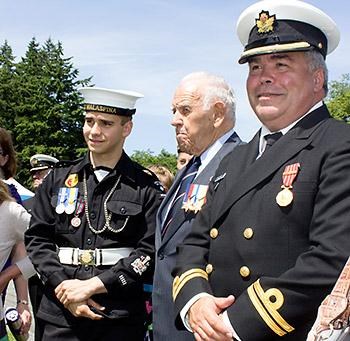Throwing lines, signalling with semaphore and becoming drenched while working together to stop an imaginary ship from sinking were but a few things celebrated during Royal Canadian Sea Cadet Corps Malaspina’s annual inspection.
This year’s inspection marked a milestone for the Powell River corps—60 years—and in fitting military style the last of its founding members returned to Powell River to inspect the cadets.
“I’m very happy that Gary McLeod came up to review our cadets today,” said Malaspina corps Commanding Officer Lieutenant (N) Dave McLennan just before presenting him with a brass plaque to mark the occasion.
The youth group started in 1953 after Jack Hallier and Bill Nicholson approached Gary McLeod who had just returned to Powell River after spending 10 years at sea on park ships in the Canadian Merchant Navy. The merchant navy played a key roll during the Battle of the Atlantic transporting food, supplies and weapons to the United Kingdom to help the war effort in Europe.
“After 10 years at sea being tossed around by the oceans I had enough and came home,” said McLeod, as he addressed the cadets and their families in the mess hall in the barracks on Timberlane, May 31, after the inspection ceremonies. At first he said he wanted no part of the idea, but not long after was convinced and joined on to become the corps’ first executive officer and played a number of other key roles.
In that first year officers Nicholson, Hallier and McLeod interviewed more than 45 boys and their parents, choosing about 35 of the applicants to form the corvette corps.
Don Nassichuk and Graham Lyons were two of the boys selected to corps in its first year.
“It’s hard to believe that it has been 60 years,” said Nassichuk at the inspection. “This was very good grounding for me. It’s the grounding that’s important.” Nassichuk went on to a career in the Royal Canadian Mounted Police.
McLeod said he was proud of his cadets from that first year when they took honours for best corps in their class in Canada.
The three founding members of the corps all left in 1955. McLeod went back to sea on Canadian National Steamships and didn’t return to Powell River during his career, Nicholson moved to Nanaimo to work for Pittsburgh Glass and Hallier moved to northern Canada to work for International Telegraph and Telephone. Both Nicholson and Hallier died in 2000.
“I stand here today with a great deal of pride in what the three of us accomplished 60 years ago and what has been accomplished since then from the cadets and officers who have followed,” said McLeod. “To see what is here today I find mind-boggling. I’m very proud to have been a part of this. There is one order I’d like to give to all of you and the officers: carry on.”



